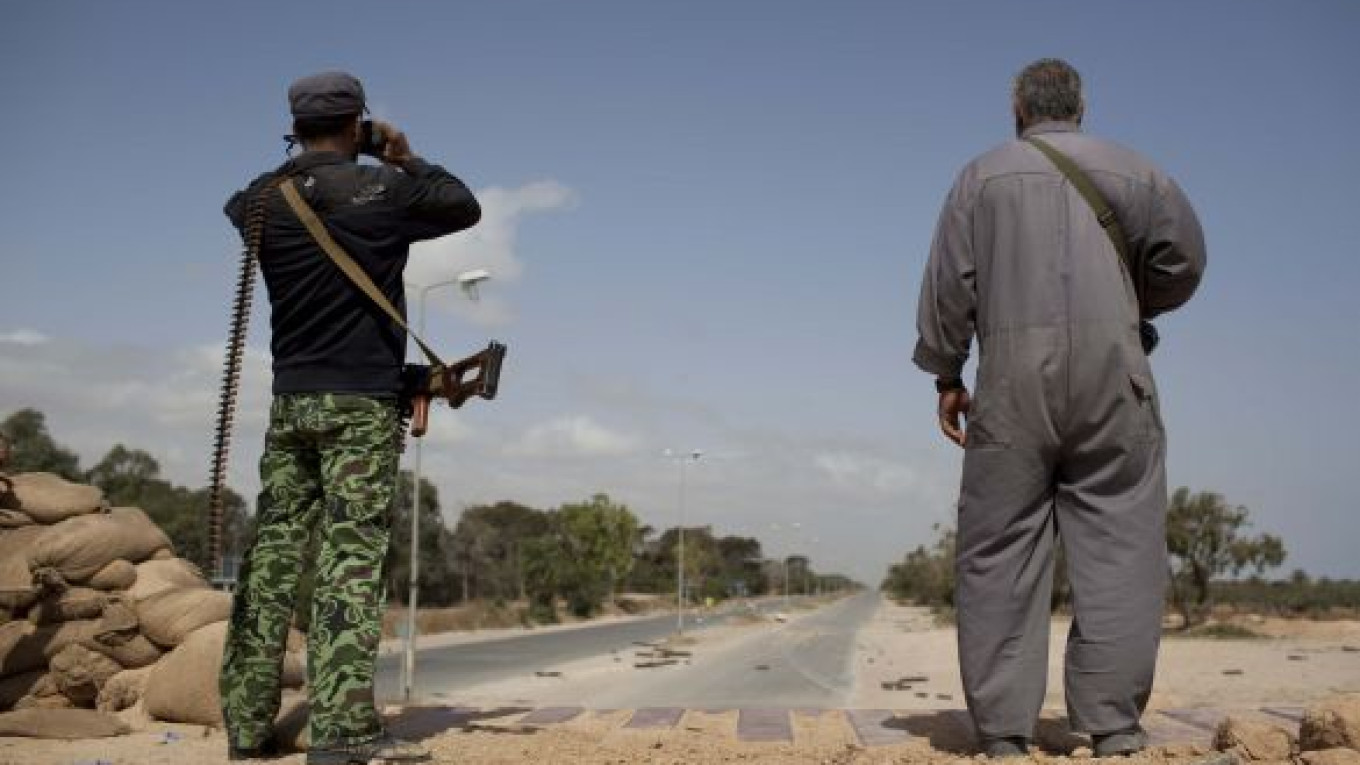A week after talks with an envoy for Libyan leader Moammar Gadhafi, Foreign Minister Sergei Lavrov held talks with representatives of the country's opposition Monday.
The delegation for the rebel government in Benghazi was headed by Abdurraham Mohamed Shalgham, a former foreign minister and the country's last UN ambassador who famously broke with Gadhafi during an emotional speech before the Security Council in February when he likened the Libyan leader to Adolf Hitler.
Shalgham said after the talks that the rebel government wanted to maintain ties with Russia because the country was a permanent member of the UN Security Council.
He also expressed support for a NATO-led bombing campaign in his country, saying it was strictly within the limits of a Security Council resolution over Libya. "NATO entered Libya not on a NATO decision but on a UN decision to protect the civilian population," he said, in comments carried by Interfax.
The Foreign Ministry has sharply criticized the military campaign, saying it overstepped the UN resolution by aiming to bring the rebels to power.
Shalgham said he was not bothered by Moscow's criticism and that the question was not whether Russia was indeed a true ally.
"Russia is an important state and plays an important role in Libya. Russia has its own ideas, and I want to listen to them," he said.
The meeting with the opposition was initially scheduled for last week but postponed for "technical reasons."
Lavrov said before Monday's talks that Moscow's main aim in mediating in the conflict was to reach a truce in the North African country.
But Shalgham said the rebels would not negotiate with the government in Tripoli.
"Gadhafi … is destroying the Libyan population. We are not planning to hold negotiations with him," he said, RIA-Novosti reported.
Shalgham also spoke out against the disposal of NATO ground forces.
Last Tuesday, Lavrov met in Moscow with Muhammad Ahmed al-Sharif, the general secretary of Gadhafi's World Islamic Call Society.
That meeting was shrouded in mystery, with Libyan Embassy officials saying they knew nothing of it. This time, however, a Libyan diplomat told Interfax that the embassy was aware of the talks with Shalgham but would not comment on them.
Monday's meeting came as Western countries stepped up their support of the rebel government in Benghazi.
The United States dispatched its highest-ranking diplomat in the Middle East, Assistant Secretary of State Jeffrey Feltman, to Banghazi, while the European Union and Germany opened liaison offices in the east Libyan city, The Associated Press reported.
Also, French media reports said France and other NATO countries are planning to use helicopters in Libya, thus significantly stepping up the campaign.
Analysts said it remained to be seen what diplomatic clout Moscow will have on Libya's future.
"They seem to understand that Gadhafi has no future, but as usual they are pretty late," said Alexei Malashenko, a foreign policy analyst with the Carnegie Moscow Center.
A Message from The Moscow Times:
Dear readers,
We are facing unprecedented challenges. Russia's Prosecutor General's Office has designated The Moscow Times as an "undesirable" organization, criminalizing our work and putting our staff at risk of prosecution. This follows our earlier unjust labeling as a "foreign agent."
These actions are direct attempts to silence independent journalism in Russia. The authorities claim our work "discredits the decisions of the Russian leadership." We see things differently: we strive to provide accurate, unbiased reporting on Russia.
We, the journalists of The Moscow Times, refuse to be silenced. But to continue our work, we need your help.
Your support, no matter how small, makes a world of difference. If you can, please support us monthly starting from just $2. It's quick to set up, and every contribution makes a significant impact.
By supporting The Moscow Times, you're defending open, independent journalism in the face of repression. Thank you for standing with us.
Remind me later.


